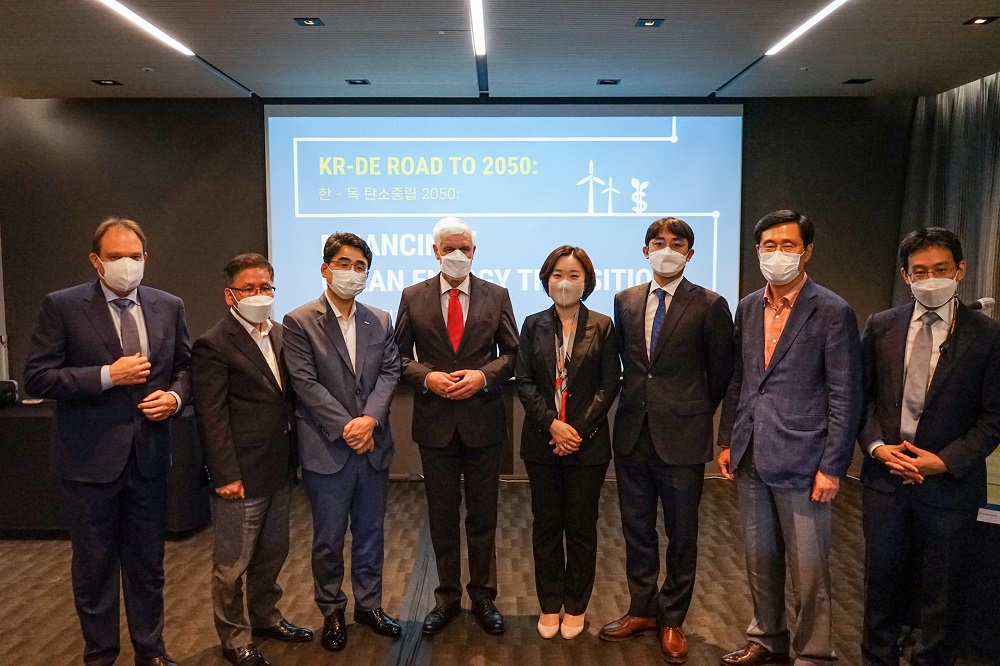Financing clean energy transition an urgent task for S. Korea and Germany, say experts
Amid South Korea and Germany’s carbon neutrality pledges and IEA warnings to stop new fossil fuel financing to reach net-zero emissions, government, civil society, and industry representatives from the two countries discuss the next steps needed to shift finance away from fossil fuels and toward clean energy transition.

September 30, 2021 – As South Korea and Germany pursue carbon neutrality, experts from the two countries explored the role of finance in achieving net-zero emissions at the “KR-DE Road to 2050: Financing Clean Energy Transition” webinar held by the Embassy of Germany in Korea, Solutions for Our Climate (SFOC), Climate Transparency, and the Office of National Assembly Member Soyoung Lee.
Assemblywoman Soyoung Lee, in her opening speech, noted that the Korean National Assembly has legislated a ‘net zero by 2050’ target through the “Carbon Neutrality Green Growth Act” setting the legal foundation for a transition away from fossil fuel and towards sustainable energy, and that the financial sector must play a critical role in facilitating such transition.
In his welcome address, Ambassador of Germany to Korea Michael Reiffenstuel highlighted the need for the two countries’ clean energy investment: “The longstanding traditional German-Korean friendship has become ever more crucial as we are ‘building back better’ for the post-COVID world. Clean energy investment remains far short of what will be required to avoid severe impacts from climate change.”
“It is high time to set the right incentives to leverage the maximum amount of private investment into clean energy. Germany and Korea stand side by side in achieving this goal – through our energy partnership and close multilateral cooperation,” he added.
Tom Howes, Head of Energy and Environment at the International Energy Agency (IEA), delivered a keynote presentation highlighting the organization’s recent Net Zero by 2050 Roadmap analysis, which found that there can be no new coal power and no new oil and gas development if the world is to prevent the worst catastrophes of climate change. Meanwhile, massive investment into renewables and improvements in regulatory regimes, especially in emerging markets and developing economies, would be needed, he said.
Civil society also warned that South Korea remains a major fossil fuel financier. “This past April, South Korea committed to ending financing for overseas coal power projects, but the country must now face the elephant in the room: oil and gas financing,” said Sejong Youn, climate finance program director of Seoul-based NGO SFOC.
Referring to findings from SFOC’s recent report, Fueling the Climate Crisis: South Korea’s Public Financing for Oil and Gas, which found that Korea provided more than $127bn in public financial support for overseas oil and gas projects over the past decade, Youn said: “Public financial institutions must urgently respond to the IEA findings on stopping new fossil fuel infrastructure and development. South Korea, in particular, needs to immediately stop new oil and gas financing, and establish plans to phase out its existing extensive support for fossil fuels.”
Christof Wegner, Deputy Head of Division of Germany’s Ministry for Economic Affairs and Energy introduced the country’s current export credit policies, and efforts to align finance with energy and climate policies: “Germany is trying to ensure that its export finance policy follows rhetoric for stronger climate action and energy transition. But there are challenges in building a proper incentive structure for green finance under strict regulations. These policies must be in place, however, to enable energy transition for climate action.”
Industry and financial sector representatives in Korea also chimed in, expressing the challenges in phasing out fossil fuel finance. Seung Dal Baek, Vice President of K-Sure: “As a public institution carrying the mission of supporting Korean corporations’ growth in the international market, we need to keep a balance between industrial development and environmental protection. However, we are willing to follow the trend in international regulations on fossil fuel restrictions, especially among the OECD countries.”
Yongho Son, Executive Director of Samsung C&T, expressed similar concerns while stressing the need for more discussion on just transition: “There are still demands for fossil fuels which the Korean construction companies have the competitive edge for. We need a balanced outlook on the speed and cost of transition toward renewables with extensive discussions on just transition.”
Gerd Leipold, Program Director of Climate Transparency, closed the event with remarks on the importance of public finance in steering energy transition: "As major economies and public financiers South Korea and Germany have a critical role to play in phasing out fossil fuels and enabling clean energy globally. This is why Germany's and Korea's public financial institutions have to provide the right signals to the private sector.”
ENDS.
Solutions for Our Climate (SFOC) is a South Korea-based group that advocates for stronger climate change policies and transition towards a fossil-free society. SFOC is led by legal, economic, financial, and environmental experts with experience in energy and climate policy and works closely with policymakers.
Climate Transparency is a global partnership of 14 think tanks and NGOs that brings together experts from the majority of G20 countries. Our mission is to encourage ambitious climate action in the G20 countries: we inform policymakers and stimulate national debate.
For media inquiries, please contact:
Jeeyeon Song, Communications Officer, SFOC, jeeyeon.song@forourclimate.org
Photos of the event can be found here.





 Prev
Prev Next
Next